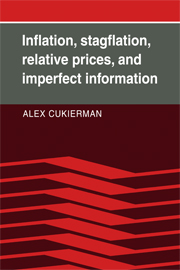Book contents
- Frontmatter
- Contents
- Preface
- 1 A general overview
- Part I Aggregate–relative confusion
- 2 Asymmetric information in economics and the information conveyed by prices and other signals
- 3 Aggregate–relative confusion: implications for the Phillips curve
- 4 Aggregate–relative confusion: implications for the distribution of inflationary expectations and for inflation uncertainty
- 5 Implications of inflation uncertainty and differential inflationary expectations for the bond market and its allocative efficiency
- 6 Aggregate–relative confusion: implications for relative price variability
- 7 Place of the aggregate–relative confusion within the economics of asymmetric information: some concluding reflections
- Part II Permanent–transitory confusion
- Notes
- Glossary of symbols
- References
- Index
6 - Aggregate–relative confusion: implications for relative price variability
Published online by Cambridge University Press: 07 October 2011
- Frontmatter
- Contents
- Preface
- 1 A general overview
- Part I Aggregate–relative confusion
- 2 Asymmetric information in economics and the information conveyed by prices and other signals
- 3 Aggregate–relative confusion: implications for the Phillips curve
- 4 Aggregate–relative confusion: implications for the distribution of inflationary expectations and for inflation uncertainty
- 5 Implications of inflation uncertainty and differential inflationary expectations for the bond market and its allocative efficiency
- 6 Aggregate–relative confusion: implications for relative price variability
- 7 Place of the aggregate–relative confusion within the economics of asymmetric information: some concluding reflections
- Part II Permanent–transitory confusion
- Notes
- Glossary of symbols
- References
- Index
Summary
Introduction and some evidence
A basic postulate of neoclassical economics is that relative prices are determined only by real factors, whereas the general price level depends on the quantity of money. A doubling of the quantity of money will, in this view, double all prices without affecting relative prices. This dichotomy between the determinants of relative prices and those of the general price level is a useful device to organize our thinking about the economy. It should be viewed as a first approximation, however, rather than a full account of the possible relationships between relative prices and the general price level. Recent evidence brought by Glejser (1965) for the Organization for Economic Cooperation and Development (OEDC) countries, Vining and Elwertowski (1976) and Parks (1978) for the United States, Blejer (1981) for Argentina, Hercowitz (1981) for Germany, Blejer and Leiderman (1982) for Mexico, and Fischer (1981a, 1982) for the United States and Germany suggests that changes in the general level of prices are not really independent of changes in relative prices.
This evidence raises two basic questions. One concerns the direction of causality between relative price changes and changes in the general price level. The other can be stated as follows: Is it necessary to totally abandon the idea that there is a dichotomy between the determinants of general and relative prices to explain their observed relationship, or is there hope of explaining it by an appropriate modification of the dichotomy paradigm?
- Type
- Chapter
- Information
- Publisher: Cambridge University PressPrint publication year: 1984



